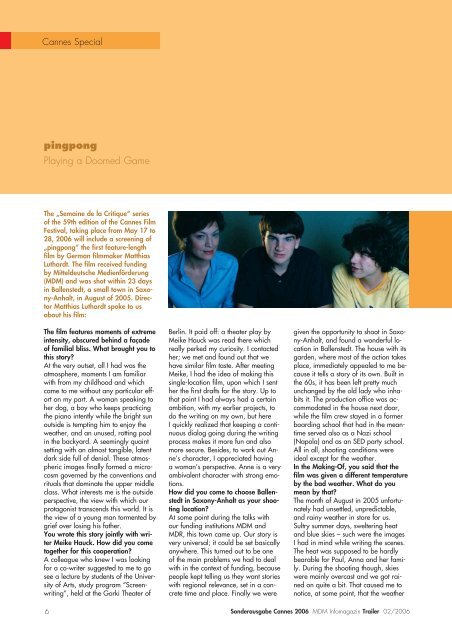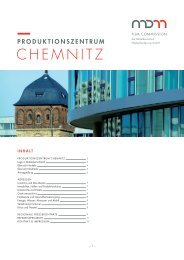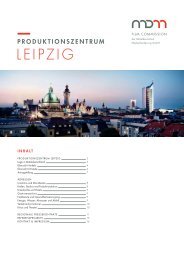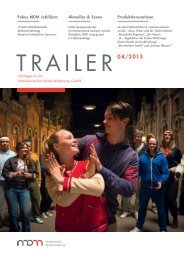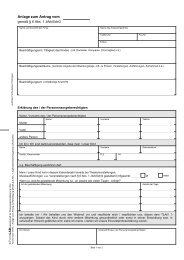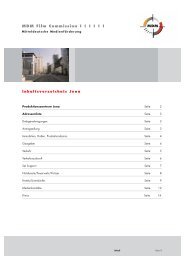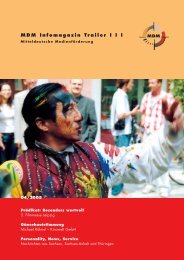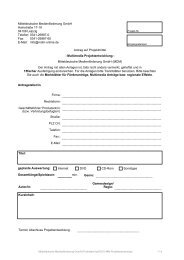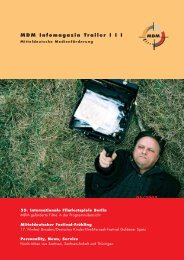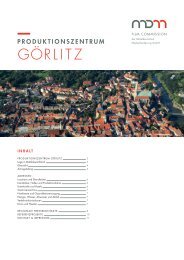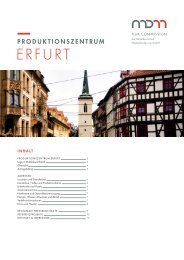Download - Mitteldeutsche Medienförderung GmbH
Download - Mitteldeutsche Medienförderung GmbH
Download - Mitteldeutsche Medienförderung GmbH
Erfolgreiche ePaper selbst erstellen
Machen Sie aus Ihren PDF Publikationen ein blätterbares Flipbook mit unserer einzigartigen Google optimierten e-Paper Software.
Cannes Special<br />
pingpong<br />
Playing a Doomed Game<br />
The „Semaine de la Critique“ series<br />
of the 59th edition of the Cannes Film<br />
Festival, taking place from May 17 to<br />
28, 2006 will include a screening of<br />
„pingpong“ the first feature-length<br />
film by German filmmaker Matthias<br />
Luthardt. The film received funding<br />
by <strong>Mitteldeutsche</strong> <strong>Medienförderung</strong><br />
(MDM) and was shot within 23 days<br />
in Ballenstedt, a small town in Saxony-Anhalt,<br />
in August of 2005. Director<br />
Matthias Luthardt spoke to us<br />
about his film:<br />
The film features moments of extreme<br />
intensity, obscured behind a façade<br />
of familial bliss. What brought you to<br />
this story?<br />
At the very outset, all I had was the<br />
atmosphere, moments I am familiar<br />
with from my childhood and which<br />
came to me without any particular effort<br />
on my part. A woman speaking to<br />
her dog, a boy who keeps practicing<br />
the piano intently while the bright sun<br />
outside is tempting him to enjoy the<br />
weather, and an unused, rotting pool<br />
in the backyard. A seemingly quaint<br />
setting with an almost tangible, latent<br />
dark side full of denial. These atmospheric<br />
images finally formed a microcosm<br />
governed by the conventions and<br />
rituals that dominate the upper middle<br />
class. What interests me is the outside<br />
perspective, the view with which our<br />
protagonist transcends this world. It is<br />
the view of a young man tormented by<br />
grief over losing his father.<br />
You wrote this story jointly with writer<br />
Meike Hauck. How did you come<br />
together for this cooperation?<br />
A colleague who knew I was looking<br />
for a co-writer suggested to me to go<br />
see a lecture by students of the University<br />
of Arts, study program “Screenwriting”,<br />
held at the Gorki Theater of<br />
Berlin. It paid off: a theater play by<br />
Meike Hauck was read there which<br />
really perked my curiosity. I contacted<br />
her; we met and found out that we<br />
have similar film taste. After meeting<br />
Meike, I had the idea of making this<br />
single-location film, upon which I sent<br />
her the first drafts for the story. Up to<br />
that point I had always had a certain<br />
ambition, with my earlier projects, to<br />
do the writing on my own, but here<br />
I quickly realized that keeping a continuous<br />
dialog going during the writing<br />
process makes it more fun and also<br />
more secure. Besides, to work out Anne’s<br />
character, I appreciated having<br />
a woman’s perspective. Anne is a very<br />
ambivalent character with strong emotions.<br />
How did you come to choose Ballenstedt<br />
in Saxony-Anhalt as your shooting<br />
location?<br />
At some point during the talks with<br />
our funding institutions MDM and<br />
MDR, this town came up. Our story is<br />
very universal; it could be set basically<br />
anywhere. This turned out to be one<br />
of the main problems we had to deal<br />
with in the context of funding, because<br />
people kept telling us they want stories<br />
with regional relevance, set in a concrete<br />
time and place. Finally we were<br />
given the opportunity to shoot in Saxony-Anhalt,<br />
and found a wonderful location<br />
in Ballenstedt. The house with its<br />
garden, where most of the action takes<br />
place, immediately appealed to me because<br />
it tells a story of its own. Built in<br />
the 60s, it has been left pretty much<br />
unchanged by the old lady who inhabits<br />
it. The production office was accommodated<br />
in the house next door,<br />
while the film crew stayed in a former<br />
boarding school that had in the meantime<br />
served also as a Nazi school<br />
(Napola) and as an SED party school.<br />
All in all, shooting conditions were<br />
ideal except for the weather.<br />
In the Making-Of, you said that the<br />
film was given a different temperature<br />
by the bad weather. What do you<br />
mean by that?<br />
The month of August in 2005 unfortunately<br />
had unsettled, unpredictable,<br />
and rainy weather in store for us.<br />
Sultry summer days, sweltering heat<br />
and blue skies – such were the images<br />
I had in mind while writing the scenes.<br />
The heat was supposed to be hardly<br />
bearable for Paul, Anna and her family.<br />
During the shooting though, skies<br />
were mainly overcast and we got rained<br />
on quite a bit. That caused me to<br />
notice, at some point, that the weather<br />
6<br />
Sonderausgabe Cannes 2006 MDM Infomagazin Trailer 02/2006


